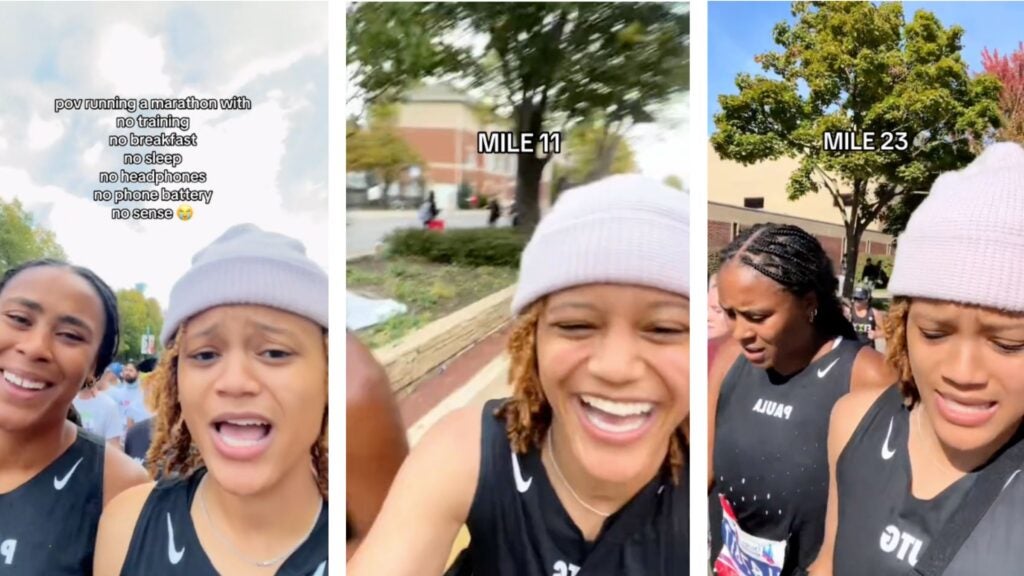No products in the cart.
Outdoor Adventure
We Talked to the Creator of the Viral No-Training Marathon Video
I have never run a marathon.
I have no intention of running a marathon. It isn’t on my bucket list. I don’t get a tinge of envy when I see the 26.2 bumper sticker proudly emblazoning the back of the car in front of me at a stoplight. I’m, personally, good. That said, I do love staggering feats of human endurance when other people accomplish them.
Thus, I was fascinated when a friend sent me a TikTok of two women arriving at the 2024 Chicago Marathon with—as the text overlaid on the video explains—“no training, no breakfast, no sleep, no headphones, no battery, and no sense.”
I sat rapt for over five minutes, watching Jaryn Garner and Paula Hughes check in mile after mile, their legs flagging but somehow still smiling, laughing, and cracking jokes deep into the back half of the marathon.
@pjpaula044 my legs are still humming 😂 #chicagomarathon #chicago #marathon #pov #firsttiktok #runner #athlete #nike #@Jaryn Garner ♬ original sound – pjpaula04
The major headline of this year’s Chicago Marathon was Ruth Chepngetich’s dizzyingly fast new women’s record of 2:09:56. The TikTok is pretty good, too, though, and I found myself wanting to know more about why it was created.
I reached out to Garner, one of the masterminds behind the video (in it, she’s the one holding the phone camera and wearing the beanie), to learn more about the backstory and to ask the ever-present internet question: Is what you claim in the video true? And if it is true, what did it feel like after the fact?
This Is What a Marathon on Minimal Training Looks Like
OUTSIDE: What did it actually feel like to run one of the country’s most famous marathons totally unprepared? How did it come to be, and what was the lead-up like?
GARNER: There was no real inspiration. The company I work for (TOGETHXR, a lifestyle brand founded by professional athletes Alex Morgan, Chloe Kim, Simone Manuel, and Sue Bird) had four bib entries for the Chicago Marathon and asked if anybody was interested about six weeks before it. Nobody jumped at the thought of the idea, so Paula [Hughes, the other woman you can see running in the video] reached out to me and said, “So, are we running the marathon?” … I truly felt it was a joke until we got to a month away, and I just kept thinking, wow, we’re really doing this.
We started to get all the information emails, and Nike began to send us stuff for the marathon, and that’s when it really got real. In the lead up, we had a Nike coach give us a few pointers (that we tried our best to attempt), and we started running like once or twice a week, but it was nothing that exceeded two to three miles. So, not enough at all.
Your baseline fitness seems… high! You don’t strike me as just popping off your couch and running a marathon. What’s your workout schedule look like, marathon training aside? Are you into distance running? Walk me through a little of your backstory.
Neither of us are runners in the slightest. We are both former D1 athletes. Paula rowed crew at Syracuse University, and I played basketball at the University of Virginia and finished my career at St. Joseph’s University. With that being said, we both hate distance running, so although we aren’t true couch potatoes, the thought of even running a mile is laughable to the two of us.
The caption on the video (“my legs are still humming”) indicates some post-race pain. Can you describe what the day and week after the race were like for your body?
The moment we crossed the finish line, we went back to a tent Nike provided to celebrate and recover for about 20 minutes and took pictures. After standing up, walking out of the tent, and heading out to get picked up, I experienced probably some of the worst pain I’ve ever felt in my lower body. Moving at a snail’s pace, every step hurt from my feet all the way up to my hips. I definitely had never experienced that. The very next day I struggled to walk and actually crawled a bit to move around.
The worst part for me was my feet. I didn’t get to 100-percent pain-free walking until nine days later, and my legs came back to 100 percent about five days later.
Seriously, Though, You Need to Train Before Your Marathon
As fun as my conversation with Garner was, I’d be remiss if I didn’t talk through the very real dangers of running 26 miles without training that builds up circulatory, respiratory, muscular, and mental fitness over time.
If you read the comments on the viral video, you’ll see lots of upvoted commenters pointing out the danger of rhabdomyolysis, a condition in which muscle tissue enters the bloodstream following overexertion, among other health concerns. (You can read a longer explanation of the dangers of running a marathon with zero training here.)
For some perspective on the issue, I also reached out to my friend Kaylyn Christopher, a former NCAA All-American distance runner for West Virginia University, Boston Marathon qualifier, and the current men’s and women’s cross-country coach at Fairmont State University, for her perspective. She had already seen the video and said she thought “it was a brave undertaking!”
But, Christopher notes, marathons typically require intentional preparation. In addition to getting miles under your belt to make sure your body is physically ready, there are other factors to consider, like nutrition and hydration. Most marathon runners spend a lot of time honing their system during training runs.
“Do you carry a handheld bottle? Is it filled simply with water or perhaps electrolytes? Or do you practice grabbing cups from water stations? Do you carry salt tabs? What about gels? Do they cooperate with your digestive system?” says Christopher. “These are things that marathon runners seek to answer through trial and error during training.”
With her own athletes, she says, under-training leads to higher occurrences of things like IT band issues and shin splints.
Garner herself noted the same in our conversation. I asked her what she would say to folks inspired to mimic her feat. She told me that she does want to be conscious of health concerns. At the same time, she says that commenters pointed out how “we helped make them feel better about their upcoming marathon, inspired them to sign up for a marathon, or just to start working out, and that has probably been more rewarding than getting that medal at the end.”
Watch the video. Run the marathon. Just spend some time training beforehand.
This interview has been edited for brevity and clarity.

Despite her feelings about marathons, Ryleigh Nucilli actually did run college track and cross-country at Washington and Lee University in Lexington, Virginia. When she’s not writing, walking dogs, or wrangling a toddler, she’s lucky to get in a few miles a week.
Want more of Outside’s Health stories? Sign up for the Bodywork newsletter.
Source link

